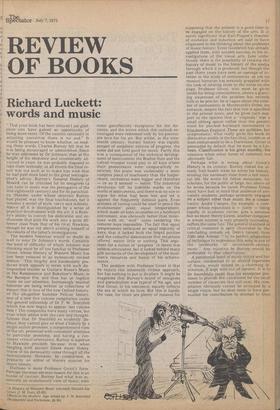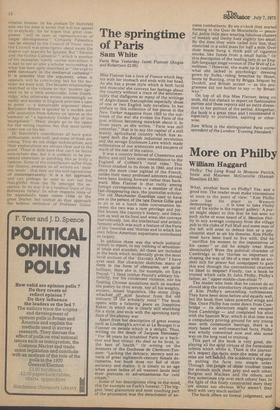REVIEW OF BOOKS
Richard Luckett: words and music
"That your book has been delayed I am glad. since you have gained an opportunity of being more exact. Of the caution necessary in adjusting narratives there is no end." It would be pleasant to know whether, on reading these words, Charles Burney felt that he was being encouraged or admonished. Since he was addressed by .Dr Johnson, then at the height of his eminence and considerably advanced in years, he was probably disposed to take them seriously; at all events the final result was not such as to make him wish that he had paid more heed to the great lexicographer's advice. Burney's General History of Musick can be criticised for its smugness (a just taste in music was the prerogative of the mid-eighteenth century) and for its parochiality (Handel, under whose direction Burney had played, was the final touchstone), but it remains a model of style, verve and industry. Above all it is distinguished by a sense of praatical involvement with the art; it is Burney's ability to convey his dedication and enthusiasm that puts his work into a quite different class from that of his rival, Hawkins, though he was not above availing himself of the results of the latter's investigations. The modern historian would no doubt do well to note Dr Johnson's words. Certainly the kind of difficulty of which Johnson was thinking must be all too familiar to Professor Grout, whose History of Western Music has just been reissued in an extensively revised edition.* This lengthy and handsomely produced work appears in series with such distinguished studies as Gustave Reese's Music in the Renaissance and Bukofzer's Music in the Baroque Era, and thus has an implicit claim on our attention. Increasingly musical histories are being written as collections of essays: this is true of the new Oxford history, of the altogether humbler Pelican history, and of a new five volume compilation under the general editorship of Dr F. W. Sternfeld Which has now begun to appear, last volume first.t The compendia have many virtues, but even when edited with the care and thoughtfulness that Dr Sternfeld so evidently displays, they cannot give us what a history by a single author promises, a comprehensive view of the art, presented with consistent attention to particular problems, and having a consistent critical orientation. Burney is superior to Hawkins precisely because, even when tangling with ancient Greek music theory, traces of his personality come through all the technicalities; Hawkins, by comparison, is Primarily an editor of literary sources for music history.
Dullness is more Professor Grout's forte. Perhaps the most obvious reason for this is an excess of caution. Burney had what was essentially an evolutionary view of music, with
A History of Western Music (revised) Donald Jay Grout (J. M. Dent, £5.95) tMusic in the Modern Age. edited by F. W. Sternfeld (Weidenfeld and Nicholson, £6.50)
some genuflectory exceptions for the Ancients, and the errors which this outlook encouraged were redeemed only by his passionate love for his art. But whilst, in the nineteenth century, literary history was rapidly purged of simplistic notions of progress, the same did not hold good for music. Partly this was a consequence of the technical development of instruments: the Boehm flute and the valved trumpet could play in all keys where their predecessors were comparatively restricted; the piano was undeniably a more complex piece of machinery than the harpsichord; orchestras were bigger and therefore — or so it seemed — better. The industrial revolution left its indelible marks on the world of instruments, and there was no one to argue for what had been lost and set it against the frequently dubious gains. Even systems of tuning could be used to prove the evolutionists' point; equal temperament, which made all keys accessible on a keyboard instrument, was obviously better than meantone with its ' wolf' notes rendering the remoter keys impossible. The fact that equal temperament embraced an equal impurity of keys, that it lacked both the limpid purities and the colourful dissonances that meantone offered, meant little or nothing. This argument for a notion of ' progress 'in music was seldom articulated, but it lurked behind many glib accounts of the development of the musician's resources and hence of his achievements.
The problem with Professor Grout is that he rejects this inherently vicious approach, but has nothing to put in its place. It might be suggested that Burney's brand of smugness and parochialism was typical of his age, and that Grout, in his nescience, equally reflects the era in which he lives. But this is hardly the case, for there are plenty of reasons for supposing that the present is a good time to be engaged on the history of the arts, It is surely significant that Karl Popper's theories of evolution and induction are said to have originated in his thinking about the problems of music history; Ernst Gombrich has already applied them, with notable success, to his investigations of the visual arts. Less ambitiously there is the possibility of relating the history of music to the history of the media through which it is produced, but though the past thirty years have seen an upsurge of in terest in the study of instruments, as yet no musical historian has seriously grappled with the task of relating them to the notes on the page. Professor Grout, who must be given credit for being conscientious, shows a glanc ing awareness of the problem but entirely
fails to be precise: he is vague about the number of instruments in Monteverdi's Orfeo, for
instance, despite the fact that this is specified in the printed score, and he gives tacit support to the opinion that a ' virginals ' was a small oblong spinet rather than the generic word for plucked keyboard instruments in Elizabethan England. These are quibbles, but symptomatic; what really gives the book its distinctive aridity is the fact that, unable or at least embarrassed to be a Darwinian. Grout is persuaded by default that he must be a Linnean. Classification is his great standby, his resource when other forms of comment too obviously fail. Perhaps what is wrong about Grout's History is its context. Burney risked his al ready frail health when he wrote his history, stealing the necessary time from a full musical life. He wrote for fellow musicians, for
scholars, for the public at large, but above all
he wrote because he cared. Professor Grout must have had in mind that audience of uni versity students, perhaps primarily engaged
on a subject other than music. He is conservath;e: Andre Campra, for example, a coma
poser whose reputation is — justly — rising rapidly in academic circles, gets a mention but no more; Henry Lawes, another composer in whom interest is very properly increasing, suffers the same fate. The general standard of critical comment is aptly illustrated by the concluding remark on Dido's lament from
Dido and Aeneas: "In its perfect adaptation of technique to expression this song is one of the landmarks of seventeenth-century music," Any injustice by Burney would be preferable to that observation, A penitential band of music critics and historians, condemned to an eternal repertoire of Souza, would indeed be a charming institution, if kept well out of earshot. It is to Dr Sternfeld's credit that his enterprise pro
mises to provide few candidates for the small number of vacancies that still exist. His com pilation obviously cannot be animated by a single vision, but he does seem to have persuaded his contributors to attempt to treat
related themes. In his preface Dr Sternfeld sets out his aims in terms that will not appeal to everybody, for he hopes that great composers " will be seen as representatives of larger developments ". Certainly Palestrina can be related to the Council of Trent: since the Council was prescriptive about music the matter can scarcely be ignored. But " Perotin and I he Gothic Cathedral ", which is another of his examples, hardly carries conviction; it is sad to see so able a scholar succumbing to what has been aptly described as " the urge to seek sanctuary in the mediaeval cathedral." It is possible that the argument, when it appears, will be convincing, but for the moment we must wait. The broader relationships sketched in the volume on the ' modern age ' tend to he a little predictable; John Deathridge, who otherwise writes interestingly on music and society in England, provides a case in point — a sustainable argument about Benjamin Britten is spoiled by a modish and silly quotation from Adorno on operas as the -memory of " a legendary Golden Age of the bourgeoisie". Many people go to the opera for the wrong reasons, but that must surely come low on the list.
Di Sternfeld's contributors all have great enthusiasm, write well, and many of them are young. They do not dodge technicalities, and their explanations are always clear and to the point. There is little here that can't be found somewhere else, but it is unlikely to be presented elsewhere in anything like as lively a fashion. Some of the contributors suffer from the illusion, endemic to all writers on ' modern music ', that they are the sole repositories of contemporaneity. It is a lax approach, and can perhaps be used to sort out the thoLghtful from the fly amongst the essayists. In its way it is a residual trace of the Burneyan fallacy. In other respects none of Dr Sternfield's team comes close to the great Doctor, but neither do they approach the tedious eminence of Professor Grout













































 Previous page
Previous page